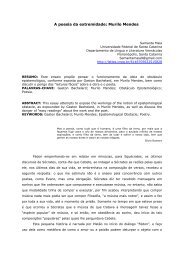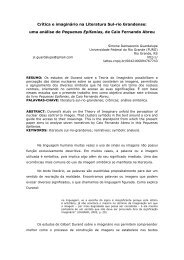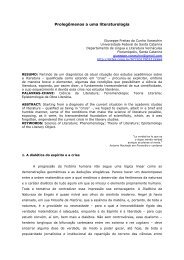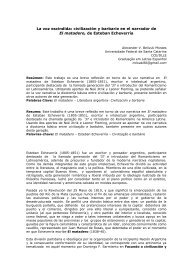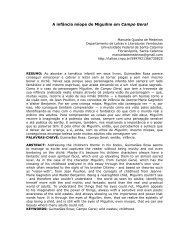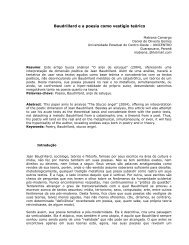Incongruity and Comicality in Woody Allen's prose
Incongruity and Comicality in Woody Allen's prose
Incongruity and Comicality in Woody Allen's prose
You also want an ePaper? Increase the reach of your titles
YUMPU automatically turns print PDFs into web optimized ePapers that Google loves.
Actually, <strong>in</strong> mak<strong>in</strong>g use of deviations from what is normatively expected by<br />
the reader <strong>in</strong> terms of social, cultural <strong>and</strong> l<strong>in</strong>guistic conventions, Allen is employ<strong>in</strong>g<br />
a comic formula already remarked by the Ancient Greek <strong>and</strong> Lat<strong>in</strong> theorists.<br />
Aristotle, for <strong>in</strong>stance, states <strong>in</strong> his Rhetoric (3.11) that:<br />
“Novelties of expression” arise when there is an element of surprise, <strong>and</strong><br />
(...) the th<strong>in</strong>g turns out contrary to what we were expect<strong>in</strong>g, like the jokes<br />
found <strong>in</strong> comic writers, produced by deceptive alterations <strong>in</strong> words, <strong>and</strong> by<br />
unexpected words <strong>in</strong> verse, where the listener anticipates one th<strong>in</strong>g <strong>and</strong><br />
hears another. (ARISTOTLE apud ERMIDA, 2011, p. 340)<br />
And also Cicero <strong>in</strong> his De Oratore (II, LXIII.255) claims that “when we are<br />
expect<strong>in</strong>g to hear a particular phrase, <strong>and</strong> someth<strong>in</strong>g different is uttered (...) our<br />
own mistake even makes us laugh ourselves.” (Apud ibid.)<br />
As we could see from a few examples, there is a great profusion of<br />
<strong>in</strong>congruent dialogues <strong>and</strong> situations which make up the basis of Allen’s “The Whore<br />
of Mensa”. Moreover, this procedure is not only manifested <strong>in</strong> the content, but also<br />
<strong>in</strong> the structure of the narrative. Consider<strong>in</strong>g that the plot of “The Whore of Mensa”<br />
is centered on detective Kaiser <strong>and</strong> on his attempt to solve a particular case, we<br />
could f<strong>in</strong>ally state that Allen’s story ma<strong>in</strong>ta<strong>in</strong>s a close bond with the detective fiction<br />
genre, characteristic of authors such as Edgar Allan Poe or Arthur Conan Doyle.<br />
Once aga<strong>in</strong>, however, Allen employs the conventional elements of that fictional<br />
genre – the figure of the detective, the ‘victim’, a difficult problem to solve, a ‘risky<br />
<strong>in</strong>vestigation’, the solution of the case – only for the sake of parody<strong>in</strong>g them, for<br />
the circumstances related to Kaiser’s case are motivated by a peculiar <strong>and</strong> pathetic<br />
reason, which <strong>in</strong> the end, <strong>in</strong>stead of <strong>in</strong>spir<strong>in</strong>g tension <strong>and</strong> creat<strong>in</strong>g suspense, as it<br />
could be expected <strong>in</strong> a detective story, turns out comic. In order to better exam<strong>in</strong>e<br />
how the parody of genre functions as a literary procedure <strong>in</strong> Allen’s <strong>prose</strong>, we<br />
could also make an account of another literary piece <strong>in</strong>cluded <strong>in</strong> the book Without<br />
Feathers, the one which is entitled “The Early Essays”.<br />
As its title already suggests, “The Early Essays” (first published <strong>in</strong> The New<br />
Yorker, <strong>in</strong> 1973 – one year before the publication of “The Whore of Mensa”) is a<br />
piece which consists of the supposed early essays written by <strong>Woody</strong> Allen. Thus,<br />
s<strong>in</strong>ce it is composed of concise texts written <strong>in</strong> the format of essays, this particular<br />
piece, unlike “The Whore of Mensa”, is not regulated by a plot or by a narrative<br />
unity, but <strong>in</strong>stead it depicts a number of pseudo-reflections concern<strong>in</strong>g a variety of<br />
themes, as may be attested <strong>in</strong> the <strong>in</strong>dication forged at the open<strong>in</strong>g of the text:



